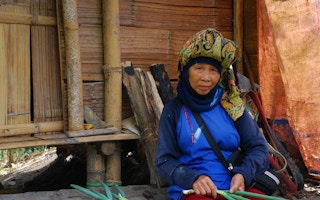Cynthia Ong heads up Forever Sabah, a nonprofit that works to advance conservation, climate resilience and land rights on Malaysia’s lush rainforest island of Borneo.
The 58-year-old grew up in the 1960s in rural nature-rich Sabah, where she enjoyed playing on the beach, in trees and streams, and catching fish. Building on a childhood spent outdoors, Ong has amassed three decades of experience working in entrepreneurship, environmental justice and community activism.
Ong credits her training in hotel and catering management in Switzerland during her late teens and early 20s as one driving force of her later green career path and work ethic.
Multi-tasking and - most importantly - not being afraid to get stuck into a task have proved vital skills, she said.
Her work in the hotel industry - from food costing, peeling potatoes and sweeping floors to greeting visiting presidents - helped Ong in her later roles as a co-founder, board director and CEO of numerous for- and non-profit organisations in Southeast Asia and the United States.
As chief executive of Forever Sabah, Ong and her team seek to resolve conflicts and other problems facing local communities in areas such as food, agriculture, fisheries, forests, water, soil, infrastructure and energy.
The group strives to create more sustainable or “circular” local economies through things like improving river water quality, stopping illegal fishing and logging, supporting community and indigenous land rights, and conserving nature.
Why did you choose this job?
“As I grew through my 30s, 40s and 50s, it was about aligning with a sense of purpose - waking up in the morning and saying: ‘I’m doing what I care about’.
No matter if I’m doing 18-hour days or it’s hard and exhausting - there is nothing else I would rather do. For me, I am a consummate hard worker and want to wake up and say what I’m going to do with my life today will align with what matters most to me.
“
What do the new climate modelling and scenarios mean for Sabah and Borneo? Every day it’s about revealing new knowledge and learning new things, and sharing that.
Cynthia Ong, co-founder, Forever Sabah
So it doesn’t feel like a job - it is a life’s work or purpose. There is nothing I’d rather do and I’d do this for love and fresh air. I have a deep ancestral connection to this region and to Sabah and Borneo.
It was partly the job chose me and I responded to it. And on another level, I created the job out of a sense of passion and responsibility. I was asked a question and wanted to treat the question seriously: can you help? I didn’t want to say I was busy … without being religious, I felt called to respond. If you said when I was at hotel school, I’d be working in climate, carbon, conservation issues for the rest of my life, I’d have been surprised.”
What do you enjoy about your job?
“I love going to work every day. Every day is different. I am surrounded by folks passionate about the same things in different ways and perspectives. We may even disagree or argue, but it comes from a place of feeling responsible and wanting to do something. It’s never dull. It’s always edgy and raw, very alive. Sometimes I say I wish it was more boring because it can be too exciting. It’s like being at the edge of where the Earth is evolving to, where the future is unfolding and you’re on that wave. I love that.
Climate change is very present and things are unfolding all the time with new reports and findings … so taking what they’re finding out globally to the very hyper-local and regional level is exciting. What do the new climate modelling and scenarios mean for Sabah and Borneo? Every day it’s about revealing new knowledge and learning new things, and sharing that.”










